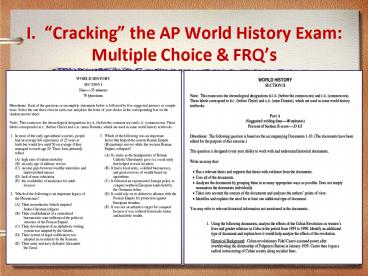I. - PowerPoint PPT Presentation
1 / 51
Title:
I.
Description:
I. Cracking the AP World History Exam: Multiple Choice & FRQ s – PowerPoint PPT presentation
Number of Views:162
Avg rating:3.0/5.0
Title: I.
1
I. Cracking the AP World History Exam
Multiple Choice FRQs
2
THE WHAP EXAM
- 1. 70 multiple-choice 55 min.
- 2. 3 essays (9 pts ea.)
- 10-min. reading period (review DBQ docs!)
- 2 hours for DBQ, CCOT, Compare/Contrast essays
3
The Units
TimePeriod of Questions of Questions
Foundations 8000 B.C.E.-600 C.E. 19-20 13-14
Classical Empires 600-1450 22 15-16
Post-Classical 1450-1750 19-20 13-14
Industrial Rev. 1750-1914 19-20 13-14
Contemporary 1914-present 19-20 13-14
Total 70
4
Make an Educated Guess
- When Europeans arrived in sub-Saharan Africa in
the 1400-1500s the African slave trade was - (A) just beginning
- (B) an institution Europeans had to establish
- (C) well established and hundreds of years old
- (D) still under the control of Ottoman traders
5
WORLD REGIONS
6
Unit 1
- 8,000 B.C.E. 600 C.E.
7
Big Picture
- 1st River Valley Civs Neolithic Revolution
- Classical Empires
- Nomads threat to empires
- Religion/goods spread merchants/missionaries
- New trade routes (Silk Roads, Indian Ocean)
- Hinduism, Buddhism, Judaism, Christianity
8
Beginnings 8,000B.C.E 1,000 B.C.E.
- Hunters gathers
- Early humans spread from Africa
- 8,000 B.C.E. agriculture starts in MESOPOTAMIA
9
- Hunting and gathering societies were marked by
- I. widespread labor specialization
- II. little specialization of labor
- III. subsistence lifestyle
- IV. limited trade
- I, II, and III
- II, III, and IV
- I and III
- II and IV
10
Civ. Characteristics
- Farming
- Cities
- Writing
- Govt laws
- Organized religions
- Social inequality
11
Ancient Civilizations
12
(No Transcript)
13
(No Transcript)
14
Decline of Early Civs.
- By 1000 B.C.E. decline due to iron
- Minoans/Mycenaeans influenced Greeks
- Phoenicians trading empire (alphabet)
15
(No Transcript)
16
Classical Empires Rome, Han, Gupta
- (1000 B.C.E. to 600 C.E.)
17
General Characteristics
- iron (agriculture weapons)
- Regional Trade Routes
- Formal Religions Social systems
- Hinduism in India
- Confucianism in China
18
Classical Social Systems
- Based upon inequality
- 1. India Caste System
- 2. China Confucianism (rigid hierarchy)
- 3. Mediterranean
- -Greeks (land-owning aristocrats slaves)
- -Romans (land-owning patricians plebians
slaves)
19
Chinese Dynasties
- Shang, Zhou, Qin, Han
- Sui, Tang, Song
- Yuan, Ming, Qing, Republic
- Mao Deng
20
Shang (1700 - 1027 BCE)
- Aristocracy ruled
- Writing, bronze, silk
- Ancestor worship
21
Zhou (1027 - 250 BCE)
- Longest lasting Dynasty
- Beginning of Mandate of Heaven
- Taoism Confucianism introduced
- Feudal
- Built roads, expanded trade
- Ended with Warring States Period
22
China Qin Han
- Qin dynasty Legalist (strict severe)
- Emperor Shi Huangdi (Terra Cotta Warriors)
- Great Wall
- Han dynasty Confucianism
- Mandate of Heaven
- Meritocracy civil service exam
scholar-gentry - Eunuchs gained power
- Silk Roads paper, silk
- Decline corruption, nomads, loss of mandate,
crop failure, internal conflict
23
Qin (221 - 207 BCE)
24
(No Transcript)
25
- Why was the Zhou dynasty in China so long-lived?
- because their leaders were ruthless
- due to the lack of Confucianism and the rise of
Legalism - due to the ideas of Confucianism emphasizing the
duty of emperors - because average people were not allowed weapons
26
Silk Roads
- brought Buddhism to China
- Chinese silk to Europe
27
Silk Roads
28
Classical India
- Mauryan Dynasty
- - King Ashoka (wrote laws on Rock Pillars
Edicts) - - Buddhism spreads
- Gupta Dynasty Hindu golden age
29
Gupta India
- Centralized
- Golden Age military, math (pi, zero, numerals),
astronomy, medicine, lit. - Extensive Trade Silk Roads, Indian Ocean (dhow
boat) - A theatre state
- Hinduism duty to caste reincarnation
- Buddhism spreads due to inequality
- Nomads Huns
- Decline corruption, poor leadership, nomads,
overexpansion, too diverse
30
(No Transcript)
31
(No Transcript)
32
Classical India
33
Greeks
- Independent city-states (internal warfare)
- Athenian Golden Age Democracy, art,
philosophy, science - Alexander conquers spreads Greek culture
(Hellenistic Period)
34
Alexander the Great
35
Mediterranean
- Rome
- At first a Republic
- Capital Rome (centralized)
- Empire began after Julius Caesar
- Augustus Caesar Pax Romana
- Built roads (Appian Way) Aqueducts
- Christianity develops, spreads
- Decline corruption, moral decline, nomads,
inflation
36
Roman Empire
37
Public Works
The Great Builders Columns, Domes, Arches
Aqueducts, Roads, Bridges, Theaters, the Coliseum
Great Wall of China Bridges, Roads, Canals Terra
Cotta Warriors
38
Fall of Roman Empire
39
(No Transcript)
40
Persians
- Centralized bureaucracy (divided into Satraps)
- Golden Age Royal Road, military, coins, postal
service - tolerance trade
- Zoroastrianism dual forces of good evil
- Decline corruption, over taxation, Alexander
the Great
41
Persian Empire
42
In Africa
- Bantu migrations spread similar cultural traits
through Sub-Saharan Africa
43
(No Transcript)
44
AMERICAN CIVILIZATION
- The Maya, Aztecs, and Inca
45
Amerindian Civilizations
- Maya (300 CE to 900)
From Olmec traditions
- Independent city-statesdecentralized
- Astronomical calendar
- Number zero
- Written language
46
American Civilizations
Aztec 1400-1521
- militant warriors
- tributary empire
- decentralized empire
- human sacrifice
- Written language
- Spanish conquered w/
- guns disease
47
American Civilizations
Incas 1400-1540
- Rugged Andes Mts.
- Centralized empire
- terraces for farming
- network of roads bridges
- NO WRITTEN LANGUAGEbut used quipu
- Spanish conquest
48
Causes of Classical Decline
- Nomadic invaders
- Epidemics
- Corruption
- Internal decline
49
- W. Europe
- worst decline
- Byzantine Empire flourishes in East
- China
- 300 years of disunity
- India
- declines politically, but trade continues
- Hinduism spreads
50
(No Transcript)
51
(No Transcript)































